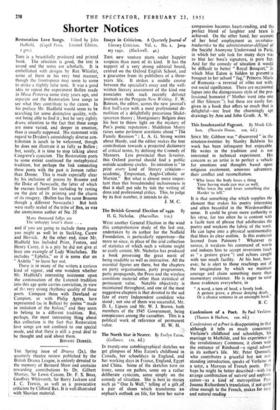SINCE Mr. Gibbon was " discovered " in the nineteen-twenties
by Stanley Baldwin his work has been infrequent but enjoyable. He writes in the tradition and is not interested in technical experiment. His concern as an artist is to perfect a vehicle for emotions and thoughts based upon religious excitement, amorous adventure, their conflict and reconciliation.
"Who loves the body loves a thing Time having made can mar as well, Who loves the soul loves something else Harder to tell.- It is that something else which supplies th: element that makes his poetry interesting and often beautiful in the Wordsworthiai sense. It could be given more authority 1-1 his verse, for too often he is content will a facile turn of phrase that adulterates the poetry and weakens the fabric of the work He can lapse into a physical sentimentality that blurs its clear outline. Is this eroticism learned from Patmore ? Whatever its source, it weakens his command of words and induces him to accept inversions (such as " a gesture grave ") and echoes caught with too much facility. At his best, how- ever, he is alert to those reachings out of the imagination by which we maintain courage and claim something more than momentary existence. He is eager to seize those evidences everywhere, in
"A word, a turn of head, a lovely look, A gesture grave, a phrase denying death, Or a chance sentence in an unsought book R. C.






































 Previous page
Previous page